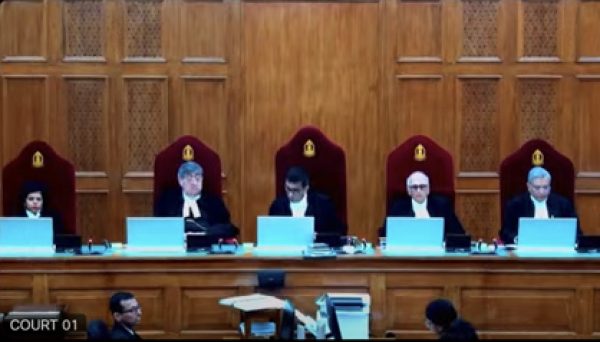Bhubaneswar: While pronouncing the verdict on same-sex marriage, Chief Justice of Supreme Court DY Chandrachud on Tuesday said that a transgender man can marry a woman or vice-versa, but this does not result in the creation of an institution.
While refusing to give marriage equality rights to LGBTQIA+ community in India, the CJI said, “This court cannot compel Parliament or state assemblies to create a new institution of marriage. We also cannot hold the Special Marriage Act unconstitutional just because it doesn’t recognise same-sex marriages, nor can we redraft the law or other legal provisions to substitute man and woman for husband and wife. The judiciary cannot legislate,” he said.
He, however, added that striking down the Special Marriage Act would take the country to the “pre-independence era”.
The five-judge bench, which also included Justices Sanjay Kishan Kaul, Ravindra Bhat, Hima Kohli, and PS Narasimha, emphasised that they were only considering the legal aspects of the Special Marriage Act and the Foreign Marriage Act and were not recognising non-heterosexual marriages.
The CJI further said the right to marriage is not a fundamental one and it attained significance as a legal institution largely because it’s regulated by the state and comes with a number of material benefits.
He, however, added that several facets of the marital relationship are reflections of constitutional values, including the right to human dignity and the right to life and personal liberty. “Choosing a life partner is an integral part of choosing one’s course of life. Some may regard this as the most important decision of their life. This right goes to the root of the right to life and liberty under Article 21 [of India’s constitution].”
“The right to enter into a union includes the right to choose one’s partner and the right to recognition of that union. A failure to recognise such associations will result in discrimination against queer couples.”
“Material benefits/services given to heterosexual couples & denied to queer couples will also be a violation of their fundamental rights.”
While announcing it’s for Parliament and state legislatures to legally recognise queer marriages, he further said, “We record the statement of the Solicitor General that the Union Government will constitute a committee to decide the rights and entitlements of persons in such unions.” The committee shall consider the following – include queer couples as family in ration cards, enabling queer couples to nominate for joint bank account, rights flowing from pension, gratuity etc.., he added.
Chief Justice Chandrachud further observed that unmarried couples, including queer couples, can jointly adopt a child. “There is no material which proves that only a married heterosexual couple can provide stability to a child. The CARA circular not giving adoption rights to queer couples is violative of Article 15 of the Constitution,” he said.
Justice Sanjay Kishan Kaul, the second senior-most judge on the bench, said “this is an opportunity for us to remedy the historical injustice and discrimination [against LGBTQ+ people] and thus governance is needed to grant rights to such unions or marriages”.
He added, that “the court cannot grant LGBTQ+ people the right to marry as that is a legislative exercise”.
While majority view was that the legislature must decide on bringing in same-sex marriage, Justice Ravindra Bhat said that he did not agree with the directions issued by the CJI on the Special Marriage Act, and giving LGBTQ+ couples the right to jointly adopt children.
The CJI also directed the Centre to ensure the queer community is not discriminated against, ensure there is no discrimination in access to goods and services, sensitise the public about queer rights, create a hotline for the queer community, create safe houses or Garima grih for queer couples, ensure inter-sex children are not forced to undergo operations and ensure that no person shall be forced to undergo any hormonal therapy. He also issued guidelines to police to not harass queer people or force them to return to their natal families.








